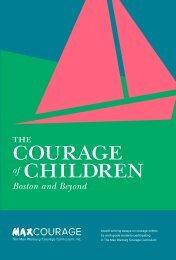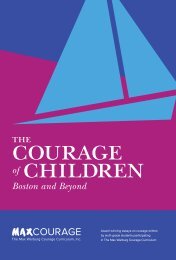The Courage of Children: Boston and Beyond XXXI
Award-winning essays on courage written by sixth-eight grade students participating in The Max Warburg Courage Curriculum.
Award-winning essays on courage written by sixth-eight grade students participating in The Max Warburg Courage Curriculum.
You also want an ePaper? Increase the reach of your titles
YUMPU automatically turns print PDFs into web optimized ePapers that Google loves.
“I am, sir. I wanted to be on TV <strong>and</strong> here I am. Maybe this is what I was getting<br />
ready for. Even if no donor turns up for me, I can help someone else.”<br />
For the people watching Max, it wasn’t pity that moved them; it was Max’s<br />
cheerful way <strong>of</strong> thinking <strong>of</strong> others before himself. <strong>The</strong> stations asked him back<br />
again <strong>and</strong> again. Hundreds <strong>and</strong> eventually thous<strong>and</strong>s <strong>of</strong> people came to give a<br />
sample <strong>of</strong> their blood <strong>and</strong> promised to be a bone marrow donor if their type<br />
matched the type <strong>of</strong> anyone in need.<br />
<strong>The</strong> <strong>Boston</strong> Globe <strong>and</strong> <strong>The</strong> <strong>Boston</strong> Herald picked up Max’s story. “Max waits for<br />
his rescue,” said one headline. “Max leads charge against disease.” <strong>The</strong><br />
reporters who met him liked Max <strong>and</strong> wanted to help him. <strong>The</strong>ir stories<br />
reassured people <strong>and</strong> gave them practical information about when <strong>and</strong> how to<br />
become a bone marrow donor.<br />
At every donor meeting, there was Max wearing a “Max + 6,000” button <strong>and</strong> a<br />
red carnation. Red for blood, he said, <strong>and</strong> laughed when people asked how he<br />
could joke about something so serious. Max would shake each donor’s h<strong>and</strong><br />
<strong>and</strong> say thank you. “You may not help me but you probably will help<br />
somebody,” he’d say.<br />
Every week, Max’s white cell count got higher. Every week, the need to find a<br />
donor got more acute. “It may be getting too late,” Dr. Parsons worried. “We<br />
have to find a donor soon.”<br />
Days slipped by. Weeks slipped by. Leaves on the trees outside Max’s window<br />
turned red <strong>and</strong> orange <strong>and</strong> then brown <strong>and</strong> fell away in the winds <strong>of</strong> early<br />
winter. Max, Fred, <strong>and</strong> their mom <strong>and</strong> dad talked about the little events <strong>of</strong><br />
each day <strong>and</strong> about the distant future but not <strong>of</strong>ten about the immediate<br />
future. <strong>The</strong>y talked about missing the rest <strong>of</strong> the summer at the shore <strong>and</strong><br />
about Take It To <strong>The</strong> Max, the dreamboat. <strong>The</strong> boat came to mean so much.<br />
It meant another summer growing up. It meant having a future. By mid-<br />
October, nearly three months after Max’s leukemia was discovered, there still<br />
was no donor. “I’m going to order the 420 for Max,” his father said. “It will<br />
mean a lot to him knowing the boat is started.” He called the boat builder,<br />
who said yes, he could have the boat ready by spring. By the time Max was well;<br />
his 420 would be ready to put into the water.<br />
With no donor found, surgery went forward to improve Max’s chances later<br />
on, just in case a donor could be found. On November 15, Max’s spleen was<br />
removed. He recovered for a week in the hospital <strong>and</strong> for six days at home.<br />
<strong>The</strong>n, on November 28, the hospital called. <strong>The</strong> lab had found the miracle<br />
match among the last batch <strong>of</strong> samples.<br />
“We don’t know, but it’s a perfect match!” the nurse said. Later, during long<br />
December days in the hospital, Max <strong>and</strong> his dad sent the anonymous<br />
benefactor a picture <strong>of</strong> the intravenous bag that held the life-giving bone<br />
marrow with a letter that said, “This is all we know <strong>of</strong> you but we want to thank<br />
you!” Much later, Mr. <strong>and</strong> Mrs. Warburg learned that the donor was a doctor<br />
in Seattle, Washington, whose great-, great-, great-, great-gr<strong>and</strong>father all the<br />
way back to the 1800s in Europe was the same as Max’s.<br />
Now, with marrow from the donor, treatment could begin to pave the way for<br />
the transplant that might save Max. Chemotherapy would be the worst part.<br />
“Your hair is going to fall out, Max,” Dr. Parsons told him. Max could see that<br />
other kids in the cancer ward had little or no hair. “It’s part <strong>of</strong> getting better,”<br />
he told Fred. But he wasn’t sure he would be brave enough. He had seen<br />
others going for their treatment <strong>and</strong> returning exhausted <strong>and</strong> in tears. He was<br />
determined he wouldn’t let the treatment sink his spirits.<br />
First Max had a tube implanted in his chest, as the doctor told him would<br />
happen, for giving medicine, taking blood samples, <strong>and</strong> for feeding him<br />
because he wouldn’t be able to eat normally. He would have to be almost in<br />
isolation in a special environment called the Laminar Flow Room. In the<br />
sealed room, ducts brought a steady, moving stream <strong>of</strong> oxygen down <strong>and</strong> away<br />
from the bed, blowing foreign substances away from Max as his system tried to<br />
accept the strange marrow <strong>and</strong> begin making its own blood.<br />
Except for daily trips to the Total Body Irradiation room--the hospital<br />
people called it the TBI--Max had to stay in the isolated room <strong>and</strong> could<br />
see few visitors. When his mom <strong>and</strong> Fred visited each day <strong>and</strong> his dad came<br />
in the evening, they had to scrub like doctors <strong>and</strong> wear cover-up coats <strong>and</strong><br />
hairnets. Even a touch could harm, so there could be no hugs to give comfort<br />
<strong>and</strong> love. Each morning the halls were cleared <strong>of</strong> contaminating strangers<br />
so Max, inside a tent, could be wheeled through the empty halls to the<br />
treatment room.<br />
Knowing he’d be lonely <strong>and</strong> expecting he’d be scared, Dr. Parsons had given<br />
Max a tape recorder so he could make a record <strong>of</strong> what was happening to him.<br />
Max told his tape recorder, “Going to TBI is really cool, like being in a space<br />
ship. <strong>The</strong> air coming in from the top <strong>of</strong> my oxygen tent is exhilarating. I feel<br />
like a great explorer from the next century gliding in on his chair.”<br />
<strong>The</strong> experience in the room wasn’t exhilarating. <strong>The</strong> drugs made Max sick.<br />
He had to stay on a metal table, head on blocks, neck stiff <strong>and</strong> body sore, for a<br />
long time. When finally he sat up, he threw up. <strong>The</strong> vomiting meant he was<br />
“Who is it?” Max asked.<br />
<strong>The</strong> <strong>Courage</strong> <strong>of</strong> <strong>Children</strong>: <strong>Boston</strong> <strong>and</strong> <strong>Beyond</strong><br />
xxii<br />
Volume <strong>XXXI</strong><br />
xxiii









